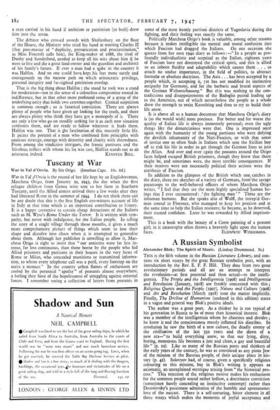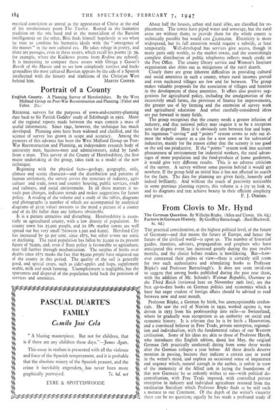A Russian Symbolist
Alexander Blok: The Spirit of music. ,(Lindsay Drummond. 5s.) THIS is the fifth volume in the Russian Literature Library, and con- tains six short essays by the great Russian- symbolist poet, with an introduction by the Rev. E. F. F. Hill.. They date from two great revolutionary periods and all are an attempt to interpret the revolution—at first potential and then actual—to the intelli- gentsia. The People and the Intelligentsia (1908) and Intelligentsia and Revolution (January,, '1918) are frankly concerned with this ; Religious Quests and the People (19o7), Nature and Culture (1908) and Art and Revolution (March 1918) treat the matter implicitly. Finally, The Decline of Humanism (undated in this edition) states in a vague and general way Blok's positive ideals.
The author was a great poet. As a thinker he is too typical of his generation in Russia to be of more than historical interest. Blok was a member of the intelligentsia whom he chastises and derides ; he knew it and the consciousness merely inflamed his diatribes. In revolution he saw the birth of a new culture, the deadly enemy of the civilisation of the last 350 years and the dawn of a new era—" to build everything anew, so that our lying, dirty, boring, monstrous life becomes a just and clean, a gay and beautiful life" (p. to). Like so many of the Russian poets and thinkers of the early years of the century, he was as convinced as any pious Jew of the mission of the Russian people, of their unique place in his- tory (p. 42). Solovyov had, of course, given a specifically religious colouring to this mission, but in Blok's writing it appears as axiomatic, an unexplained mystique arising from "the historical pro- cess." This rejection of the religious motive makes his enthusiasm for the common people sound rather hollow, a doctrinaire conviction (sometimes barely concealing an instinctive contempt) rather than Dostoievsky's passionate admiration of the humble and spontaneous love of the outcast. There is a self-torturing, bitter element in all these essays which makes the moments of joyful acceptance and mystical conviction as unreal as the appearance of Christ at the end of his revolutionary poem The Twelve. Rooted in the humanist tradition on the one hand and in the materialism of the Russian intelligentsia on the other, Blok finds himself hopelessly at sea when he tries to combine his humanist ideals with the " emergence of the masses" in the new cultural era. He takes refuge in poetry, and there are passages, even in these essays, which recall his poems (p. 39, for example, where the Kulikovo poems from Rodina are echoed). It is interesting to compare these essays with Ortega y Gasset's Revolt of the Masses and to see how completely rootless and back- groundless the most cultured Russian appears by the side of a Spanish intellectual with the history and tiaditions of the Christian West



































 Previous page
Previous page